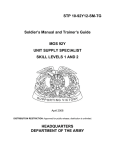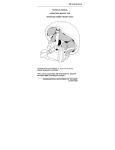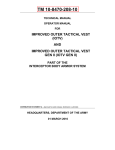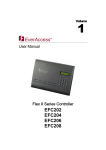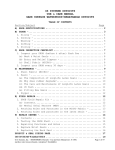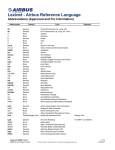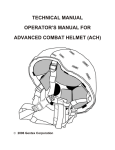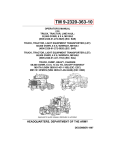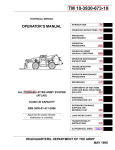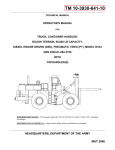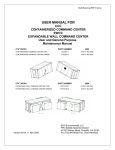Download TM-10-8415-236-10 - Liberated Manuals
Transcript
TM 10-8415-236-10 TECHNICAL MANUAL OPERATOR’S MANUAL FOR EXTENDED COLD WEATHER CLOTHING SYSTEM GENERATION III (ECWCS GEN III) DISTRIBUTION STATEMENT A: Approved for Public Release; Distribution is Unlimited. HEADQUARTERS, DEPARTMENT OF THE ARMY 30 JUNE 2008 TM 10-8415-236-10 WARNING SUMMARY This warning summary contains general safety warnings and hazardous materials warnings that must be understood and applied during operation and maintenance of this equipment. Failure to observe these precautions could result in serious injury or death to personnel. Also included are explanations of safety and hazardous material icons used within the technical manual. For first aid information, refer to FM 4-25.11. EXPLANATION OF HAZARDOUS MATERIALS ICONS BIOLOGICAL – biohazard symbol means that contact with nuclear or biological material can cause harm to the equipment or the user. CHEMICAL – drops of liquid on hand shows that the material will cause burns or irritation to human skin or tissue. FIRE – flame shows that a material may ignite and cause burns. GENERAL SAFETY WARNINGS DESCRIPTIONS WARNING Pressing, starching, dry cleaning, or the use of fabric softener will degrade the ECWCS GEN III. Failure to following these instructions could result in harm to the soldier. WARNING DO NOT store in plastic bags that could trap moisture. a TM 10-8415-236-10 WARNING If the ECWCS is exposed to any nuclear, biological, or chemical (NBC) elements, then dispose of in accordance with FM 3.11.3 b TM 10-8415-236-10 HEADQUARTERS DEPARTMENT OF THE ARMY WASHINGTON, D.C., 30 JUNE 2008 TECHNICAL MANUAL OPERATOR’S MANUAL FOR EXTENDED COLD WEATHER CLOTHING SYSTEM GENERATION III (ECWCS GEN III) REPORTING ERRORS AND RECOMMENDING IMPROVEMENTS You can help improve this manual. If you find any mistakes or if you know of a way to improve the procedures, please let us know. Mail your letter or DA Form 2028 (Recommended Changes to Publications and Blank Forms), located in the back of this manual directly to: TACOM Life Cycle Management Command, ATTN: AMSTA-LC-LMPP / TECH PUBS, 1 Rock Island Arsenal, Rock Island, IL 61299-7630. You may also send in your recommended changes via electronic mail or by fax. Our fax number is DSN 793-0726, and commercial number (309) 782-0726. Our e-mail address is [email protected]. A reply will be furnished to you. DISTRIBUTION STATEMENT A. Approved for public release; distribution is unlimited. i TM 10-8415-236-10 TABLE OF CONTENTS WP Sequence No. Page No. WARNING SUMMARY.................................................................... a HOW TO USE THIS MANUAL ......................................................... i Chapter 1 – General Information, Equipment Description and Data, and Theory of Operation General Information.......................................................................WP 0001 Equipment Description and Data ...................................................WP 0002 Figure 1. Light-Weight Cold Weather Undershirt and Drawers ......................................... 0002-2 Figure 2. Mid-Weight Cold Weather Shirt and Drawers ................................................ 0002-3 Figure 3. Fleece Cold Weather Jacket.................. 0002-4 Figure 4. Wind Cold Weather Jacket .................... 0002-5 Figure 5. Mid-Weight Cold Weather Jacket and Trousers (Soft Shell).............................. 0002-7 Figure 6. Extreme Cold Weather/Wet Weather Jacket and Trousers .............................. 0002-8 Figure 7. Extreme Cold Weather Parka and Trousers ................................................ 0002-9 Table 1. Physical Data for the ECWCS GEN III................................................. 0002-10 Theory of Operation.......................................................................WP 0003 Chapter 2 – Operator Instructions ii TM 10-8415-236-10 TABLE OF CONTENTS – Continued WP Sequence No. Page No. Operation Under Usual Conditions ................................................WP 0004 Figure 1. Active: Levels 1, 2, 5 .............................. 0004-2 Figure 2. Active: Levels 1, 4 .................................. 0004-3 Figure 3. Active: Levels 1, 5 .................................. 0004-4 Figure 4. Active: Levels 2, 5, 7 .............................. 0004-5 Figure 5. Static: Levels 1, 3, 5, 6........................... 0004-6 Figure 6. Static: Levels 1, 4, 6............................... 0004-7 Figure 7. Static: Levels 2, 3, 5, 7........................... 0004-8 Figure 8. Static: Levels 2, 3, 5, 7........................... 0004-9 Operation Under Unusual Conditions ............................................WP 0005 Chapter 3 – Troubleshooting Procedures Troubleshooting Procedures..........................................................WP 0006 Chapter 4 – Operator Maintenance Instructions Replace Hardware.........................................................................WP 0007 Fabric Repair .................................................................................WP 0008 Figure 1. Straight Stitch......................................... 0008-1 Figure 2. Edge Sew............................................... 0008-1 Figure 3. Turn Edge Under and Sew..................... 0008-1 Figure 4. Sew Rip or Tear in Trousers .................. 0008-2 iii TM 10-8415-236-10 TABLE OF CONTENTS – Continued WP Sequence No. Page No. Cleaning ........................................................................................WP 0009 Preventative Maintenance Checks and Services...........................WP 0010 Table 1. Preventative Maintenance Checks and Services ............................................... 00010-2 Chapter 5 – Supporting Information References ....................................................................................WP 0011 Components of End Items and Basic Issue Items Lists.................WP 0012 Table 1. Components of End Item List (COEI) ...... 0012-3 Table 2. Basic Issue Items List (BII).................... 0012-17 Expendable and Durable Items Lists .............................................WP 0013 Table 1. Expendable and Durable Items List......... 0013-2 iv TM 10-8415-236-10 HOW TO USE THIS MANUAL HOW TO OBTAIN TECHNICAL MANUALS When a new system is introduced to the Army inventory, it is the responsibility of the receiving units to notify and inform the Unit Publications Clerk that a Technical Manual is available for the new system. Throughout the life cycle of the new system, the Distribution Center DOL-W will also provide updates and changes to the Technical Manual. To receive new Technical Manuals or change packages to existing Technical Manuals (TM) for fielded equipment, provide the Unit Publications Clerk the full Technical Manual number, title, date of publication, and number of copies required. The Unit Publications Clerk will justify the request through the Unit Publications Officer. When the request is approved, the Unit Publications Clerk will use DA Form 12-R to order the series of Technical Manuals from the Army Publishing Directorate (APD). Instructions for Unit Publications Clerk Obtain DA Form 12-R and request a publications account from the APD Web site at http://www.apd.army.mil. Once on the Website, click on the “Orders/Subscriptions/Reports” tab. From the dropdown menu, select “Establish an Account,” then select “Tutorial” and follow the instructions in the tutorial presentation. Complete information for obtaining Army publications can be found in DA PAM 25-33. OVERVIEW This manual contains operating instructions and maintenance procedures for the Extended Cold Weather Clothing System Generation III (ECWCS GEN III). TO ORDER THIS TECHNICAL MANUAL, FOLLOW THE LINK BELOW https://www.logsa.army.mil/etms/online.htm This manual is divided into the following major sections: Front Cover. Provides information about the equipment covered by the TM. Warning Summary. Provides a summary of all warnings that apply throughout the manual. Table of Contents. Lists chapters and work packages in order of appearance. v TM 10-8415-236-10 Chapter 1. General Information, Equipment Description and Data and Theory of Operation. Provides descriptions, equipment data, and theory of operation information. Chapter 2. Operator Instructions. Provides sizing information, donning information, and operating instructions in both usual and unusual conditions. Chapter 3. Troubleshooting Procedures. Provides troubleshooting procedures for the ECWCS GEN III. Chapter 4. Operator Maintenance Instructions. Provides instructions on hardware replacement, pad suspension replacement, cleaning the ECWCS GEN III, and PMCS. Chapter 5. Supporting Information. Provides references information, Components of End Items (COEI)/ Basic Issue Items (BII) Lists, Expendable and Durable Items List and Additional Information for the ECWCS GEN III. NAVIGATION This TM is in work package format. All of the work packages contained within the TM are listed in the table of contents in the order they appear by chapters. The work package sequences number (e.g. WP 0001) is listed for each work package in the table of contents. The work package sequence number is at the top of the first page of the work package and is also a part of the page number for each work package (e.g. 0001-1). The page numbers appear at the bottom of each page. OPERATION AND MAINTENANCE Before you use the Extended Cold Weather Clothing System Generation III (ECWCS GEN III) familiarize yourself with the assembly and fitting instructions and the operating instructions (Chapter 2). Perform maintenance procedures (Chapter 3) on a regular basis. Always follow the WARNINGS and CAUTIONS. vi TM 10-8415-236-10 0001 CHAPTER 1 GENERAL INFORMATION, EQUIPMENT DESCRIPTION, AND THEORY OF OPERATION FOR EXTENDED COLD WEATHER CLOTHING SYSTEM GENERATION III (ECWCS GEN III) GENERAL INFORMATION SCOPE This manual covers the basic fitting and use instructions for the Extended Cold Weather Clothing System Generation III (ECWCS GEN III), hereafter referred to as the ECWCS GEN III. MAINTENANCE, FORMS, RECORDS AND REPORTS Department of the Army forms and procedures used for equipment maintenance will be those prescribed by DA PAM 750-8, The Army Maintenance Management System (TAMMS) Users Manual; DA PAM 738-751, or AR 700-138, Army Logistics Readiness and Sustainability. REPORTING EQUIPMENT IMPROVEMENT RECOMMENDATIONS (EIR) If your ECWCS GEN III needs improvement, let us know. Send us an EIR. You, the user, are the only one who can tell us what you don’t like about your equipment. Let us know why you don’t like the design or performance. If you have Internet access, the easiest and fastest way to report problems or suggestions is to go to https://aeps.ria.army.mil/aepspublic.cfm (scroll down and choose the “Submit Quality Deficiency Report” bar). The Internet form lets you choose to submit an Equipment Improvement Recommendation (EIR), a Product Quality Deficiency Report (PDQR) or a Warranty Claim Action (WCA). You may also submit your information using an SF 368 (Product Quality Deficiency Report). You can send your SF 368 via e-mail, regular mail, or facsimile using the addresses/facsimile numbers specified in DA PAM 750-8 The Army Maintenance Management System (TAMMS) Users Manual. CORROSION PREVENTION AND CONTROL (CPC) Corrosion Prevention and Control (CPC) of Army materiel is a continuing concern. It is important that any corrosion or degradation problems with this item be reported so that the problem can be corrected and improvements can be made to prevent the problem in future items. Corrosion specifically occurs with metals. It is an electrochemical process that causes the degradation of metals. It is commonly caused by exposure to moisture, acids, bases, or salts. An example is the rusting of iron. Corrosion damage in metals can be seen, depending on the metal, as tarnishing, pitting, fogging, surface residue, and/or cracking. Plastics, composites, and rubbers can also degrade. 0001-1 TM 10-8415-236-10 0001 CORROSION PREVENTION AND CONTROL (CPC) - Continued Degradation is caused by thermal (heat), oxidation (oxygen), solvation (solvents), or photolytic (light, typically UV) processes. The most common exposures are excessive heat or light. Damage from these processes will appear as cracking, softening, swelling, and/or breaking. SF Form 368, Product Quality Deficiency Report should be submitted to the address specified in DA PAM 750-8, The Army Maintenance Management System (TAMMS) Users Manual. DESTRUCTION OF ARMY MATERIEL TO PREVENT ENEMY USE Not Applicable to the ECWCS GEN III. PREPARTION FOR STORAGE OR SHIPMENT Do not store the ECWCS GEN III in a compressed manner, for it tends to lose some of its thermal capability when stored this way. To properly prepare for storage or shipment, make sure that the system’s components are loosely folded and are not wrapped in plastic. LIST OF ABBREVIATIONS/ACRONYMS Abbreviation/Acronym Name AAL ACU ATTN BII C CAGEC COEI COLD CPC CTA DA DoD F ECWCS GEN III JTA MTOE NBC NSN PGC Additional Authorization List Army Combat Uniform Attention Basic Issue Items Celsius Commercial and Government Entity Code Components of End Item Clean, Overheating, Loose and Layered, Dry Corrosion Prevention and Control Common Table of Allowances Department of the Army Department of Defense Fahrenheit Extended Cold Weather Clothing System Generation Three Joint Table of Allowances Modified Table Of Organization and Equipment Nuclear, Biological, and Chemical National Stock Number Procurement Group Code 0001-2 TM 10-8415-236-10 LIST OF ABBREVIATIONS/ACRONYMS - Continued TAMMS TDA TM TOC TOE U/I UOC UV WP The Army Maintenance Management System Table of Distribution and Allowances Technical Manual Table of Contents Table of Organization and Equipment Unit of Issue Usable on Code Ultra Violet Work Package END OF WORK PACKAGE 0001-3/(4 Blank) 0001 TM 10-8415-236-10 0002 EQUIPMENT DESCRIPTION AND DATA EQUIPMENT CHARACTERISTICS, CAPABILITIES AND FEATURES The ECWCS GEN III allows you to dress to adapt to varying missions and environments. It is important for you to have ECWCS GEN III components that fit you properly. The ECWCS GEN III is made up of variable layers. Modularity of the system allows you to adapt the components to your mission and environment. The ECWCS GEN III helps the soldier retain body heat, remain dry, and provides ventilation. The ECWCS GEN III is a multi-layered, insulating system. The ECWCS GEN III provides insulation to reduce the loss of body heat, and help wick moisture away from your body. The ECWCS GEN III is made up of layers that increase air space, allow you to easily adjust to your activity level, and is wind/water proof/repellant. The ECWCS GEN III can be ventilated in order to release unneeded heat and allow moisture to escape. 0002-1 TM 10-8415-236-10 0002 DESCRIPTION OF MAJOR COMPONENTS (BASE LAYER(S)) The Base Layer Base layer (Figure 1) are those adjacent to your body and should be worn comfortably loose. The main purpose of these garments is to wick excess moisture away from your body. The Light-Weight Cold Weather Undershirt and Drawers (silk-weight) make up the base layer. The Mid-Weight Cold Weather Undershirt and Drawers (Figure 2) can be used as either a base or insulating layer. Light-Weight Cold Weather Undershirt and Drawers: Base Layer Long sleeve top and full-length bottom garments constructed out of Silk-weight moisture wicking polyester (Figure 1). The undershirt has a crew neck with long sleeves and is equipped with thumb loops at the ends of the sleeves to aid in donning outer ware over the shirt. Flat seam construction reduces chafing. Material aids in the movement of moisture from the skin to the outer layers both while the wearer is moving or static. The drawers have an elastic waistband and standard front fly opening. It is worn next to the skin or with the Mid-Weight Cold Weather Shirt/Drawers for added insulation and to aid in the transfer or moisture. 3 1 2 Legend 1. Undershirt 2. Thumbloop 3. Drawers Figure 1. Light-Weight Cold Weather Undershirt and Drawers. 0002-2 TM 10-8415-236-10 DESCRIPTION OF MAJOR COMPONENTS (INSULATION LAYER(S)) Insulation Layer(s) The insulation layer(s) (Figures 2 and Figure 3) are the intermediate layer(s). They provide volume to enable you to trap warm air between your body and the outer garments. In addition, the insulation layer(s) help wick away any excess moisture. These layers should be comfortably loose to trap a sufficient volume of air. The Mid-Weight Cold Weather Undershirt and Drawers (Figure 2), and Fleece Cold Weather Jacket (Figure 3) make up the insulation layers. The Fleece Cold Weather Jacket can also be used as an outer layer. Mid-Weight Cold Weather Shirt and Drawers: Base or Insulation Layer. Long sleeve top and full-length bottom garments constructed out of polyester “grid” fleece (Figure 2). The shirt is equipped with a zippered neck and thumb loops at the ends of the sleeves to aid in donning outerware over the shirt. Provides light insulation for use in mild climates as well as acting as a layer for colder climates. During movement, provides an increase in surface area for the transportation of moisture away from the wearer. It may be worn over the Light-Weight Cold Weather Undershirt and Drawers as an insulating layer or next to the skin as a base layer. 3 1 2 Legend 1. Shirt 2. Thumbloop 3. Drawers Figure 2. Mid-Weight Cold Weather Shirt and Drawers. 0002-3 0002 TM 10-8415-236-10 0002 DESCRIPTION OF MAJOR COMPONENTS (INSULATION LAYER(S)) - Cont Fleece Cold Weather Jacket: Insulation or Outer Shell Layer The Fleece Cold Weather Jacket (Figure 3) is foliage green and acts as a primary insulation layer for use in moderate to cold climate. It is worn underneath shell layers or worn as an outer garment for mild cool days. It has a hook and loop fastening system for name tag, rank, and US Army emblem placement, as well as a full length zipper on center front. Figure 3. Fleece Cold Weather Jacket. 0002-4 TM 10-8415-236-10 0002 DESCRIPTION OF MAJOR COMPONENTS (OUTER SHELL LAYER(S)) Outer Shell Layer(s) The outer shell layer(s) (Figures 4 thru 7) are the external layers that protect you from the elements in your environment. They are made of a highly water and wind resistant material that provides greater moisture vapor transfer over current hard shell garments. Their main function is to keep you dry. In addition, they provide additional volume for trapping body heat. Increased breathability improves performance of the insulation layers by decreasing saturation due to moisture vapor accumulation. These layers should be worn comfortably loose. The Wind Cold Weather Jacket (Figure 4), Soft Shell Jacket and Trousers (Figure 5), Extreme Cold/Wet Weather Jacket and Trousers (Figure 6), and the Extreme Cold Weather Parka and Trousers (Figure 7) are the components that make up the outer shell layer. 0002-5 TM 10-8415-236-10 0002 DESCRIPTION OF MAJOR COMPONENTS (OUTER SHELL LAYER(S)) - Cont Wind Cold Weather Jacket: Outer Shell Layer The Wind Cold Weather Jacket (Figure 4) is made of a lightweight, wind resistant, and water repellant material. It acts as a minimum outer shell layer, improving the performance of moisture wicking of the insulation layers when combined with Body Armor and/or Army Combat Uniform. Use for wind stop protection during windy cool days. This layer features a simpler collar instead of a hood, a hook and loop fastening system for name tag, rank, and US Army emblem placement, as well as pockets designed with mesh linings to aide in ventilation. Figure 4. Wind Cold Weather Jacket. 0002-6 TM 10-8415-236-10 0002 DESCRIPTION OF MAJOR COMPONENTS (OUTER SHELL LAYER(S)) - Cont Soft Shell Jacket and Trousers: Outer Shell Layer Soft Shell Jacket. Jacket (Figure 5) features a storable hood, shoulder pads with a hook and loop fastening system for name tag, rank, and US Army emblem placement, adjustable cuffs, underarm zippers, pockets designed with mesh linings to aid in ventilation, and an extended tail on the jacket to provide overlap to prevent snow from entering the system. Soft Shell Trousers. Trousers (Figure 5) feature detachable suspenders (compatible with all trousers), front pockets with flap, drop seat capability, thigh cargo pockets, articulated knee, adjustable ankle cuff, and side zips on the lower leg to provide access when donning and doffing boots. 1 2 4 3 Legend 1. Storable Hood 2. Suspenders 3. Trousers 4. Jacket Figure 5. Soft Shell Jacket and Trousers. 0002-7 TM 10-8415-236-10 0002 DESCRIPTION OF MAJOR COMPONENTS (OUTER SHELL LAYER(S)) - Cont Extreme Cold/Wet Weather Jacket and Trousers: Outer Shell Layer The Extreme Cold/Wet Weather Jacket and Trousers (Figure 6) is a waterproof layer for use in prolonged and/or hard rain and cold/wet conditions. It is best used when temperatures are alternating between freezing and thawing, which creates mud and slush on the ground. Suspenders can be used with trousers if desired. Extreme Cold/Wet Weather Jacket. Features a storable hood and pass-thru pockets. Extreme Cold/Wet Weather Trousers. Features side zips on the lower legs to provide access when donning and doffing boots. 3 1 2 Legend 1. Storable Hood 2. Jacket 3. Trousers Figure 6. Extreme Cold/Wet Weather Jacket and Trousers. 0002-8 TM 10-8415-236-10 0002 DESCRIPTION OF MAJOR COMPONENTS (OUTER SHELL LAYER(S)) - Cont Extreme Cold Weather Parka and Trousers: Outer Shell Layer The Extreme Cold Weather Parka and Trousers (Figure 7) provide superior warmth with high compactability, low weight, and low volume. It is highly water and wind resistant providing wind and moderate moisture protection. It is sized to fit over the Body Armor during movement or static activities. Trouser design incorporates full side zips to allow for rapid donning and doffing over soft shell trousers. For extreme cold weather and climates; the outer most layer for last layer of protection. 2 1 Legend 1. Parka 2. Trousers Figure 7. Extreme Cold Weather Parka and Trousers. 0002-9 TM 10-8415-236-10 0002 EQUIPMENT DATA The following table provides information pertaining to the physical data for the variable layers of the ECWCS GEN III. NOTE Weights listed in Table 1 are approximate due to variations in individual sizes. Table 1. Physical Data for the ECWCS GEN III (Maximum Values for All Models). Clothing Item Layer Light-weight Cold Weather Undershirt Light-weight Cold Weather Drawers Base Weight LBS (KG) 0.35 (0.16) Base 0.3 (0.14) 2 Mid-weight Cold Weather Shirt Mid-weight Cold Weather Drawers Fleece Jacket Wind Cold Weather Jacket Soft Shell Jacket Soft Shell Trousers (w/suspenders) Base or Insulation Base or Insulation 0.7 (0.32) 0.6 (0.27) 1 1 Insulation or Outer Outer Outer Outer 1.05 (0.48) 0.75 (0.34) 1.5 (0.68) 1.6 (0.73) 1 1 1 1 Extreme Cold/Wet Weather Jacket Extreme Cold/Wet Weather Trousers Outer 0.75 0.34) 1 Outer 0.85 (0.39) 1 Extreme Cold Weather Parka Outer 2.3 (1.05) 1 2.1 (0.95) 1 Extreme Cold Weather Outer Trousers TOTAL SYSTEM WEIGHT (KG): END OF WORK PACKAGE 0002-10 12.85 (5.84) Qty 2 TM 10-8415-236-10 0003 THEORY OF OPERATION THEORY OF OPERATION This work package discusses theory of operation of the ECWCS GEN III. Extended Cold Weather Clothing System Generation III (ECWCS GEN III) is a breathable multi-layered, versatile, insulating system that allows the soldier to adapt to varying mission requirements and environmental conditions. The system is designed to maintain adequate environmental protection between 40˚F and -60˚F (4˚C and -51˚C). The ECWCS GEN III system uses moisture management principles to transfer perspiration away from your skin so you will remain dry and warm. Under certain conditions such as high work activity followed by inactivity, the use of wool or wool-cotton clothing items with ECWCS GEN III will reduce the level of environmental protection provided by ECWCS GEN III. In cold, wet and arctic environments it is recommended that you use only clothing items listed in the COEI list. Cotton undergarments and ACUs (cotton blends) are not recommended for use with the GEN III ECWCS. ECWCS GEN III is not cumbersome in weight and bulk; the total system weighs approximately 13 pounds. ECWCS GEN III is easy to maintain both in field and garrison environments if the special use and care instructions are carefully followed. END OF WORK PACKAGE 0003-1/(2 Blank) TM 10-8415-236-10 CHAPTER 2 OPERATOR INSTRUCTIONS FOR EXTENDED COLD WEATHER CLOTHING SYSTEM GENERATION III (ECWCS GEN III) OPERATION UNDER USUAL CONDITIONS INITIAL SETUP: Not applicable 0004 OPERATING PROCEDURES Keep ECWCS GEN III Clean. Clothing keeps you warm by trapping warm air against your body and in the pores of the clothing itself. If these pores become filled with dirt, sweat, or other grime, the clothing will not be able to do its job efficiently. Therefore, your clothes should be kept as clean as possible to keep you as dry as possible (Refer to WP 0008). Avoid Overheating During Activity. The key is not to be hot or cold, but comfortably cool. Sweating is a sign that your body wants, and needs, to cool down. Let the environment cool you down naturally, to avoid sweating. This may be as simple as opening buttons or unzipping the underarms of the soft shell parka, instead of removing a whole layer of clothing. Once you stop your work, or feel yourself getting cold, bundle up again just enough to keep cool. Wear ECWCS GEN III Clothing Loose and Layered. Clothes should fit loosely for comfort. The more layers used, the more warm air will be trapped. Tight clothing will also prevent air from being trapped between your body and your clothing. It is the trapped air that keeps you warm, not the clothes. Several thin layers working together will work better than one thick layer alone (i.e. wear both the Light-Weight and Mid-Weight base layers with a Fleece Jacket insulation layer and the Soft Shell Jacket and Trousers outer shell layer). Keep Clothing Dry. Clothing must be kept dry from the outside, such as putting on Extreme Wet/Cold Weather Jacket and Trousers during wet conditions, and from the inside, such as taking a layer off when you start to sweat. Once your clothes are wet, the water or sweat starts to evaporate, drawing warmth away from your body 25 times faster than when dry. NOTE Clothing combinations shown in Figures 1 through 8 represent both recommended and optional configurations. 0004-1 2 4 3 1 6 Figure 1. Active, Cold: 0° to 30°F. 0004 LEGEND Items to be Worn at this Temperature (Cold 0° to 30°F): 1-2 Light-Weight Cold Weather Undershirt and Drawers 3-4 Mid-Weight Cold Weather Shirt and Drawers 5-6 Soft Shell Jacket and Trousers TM 10-8415-236-10 0004-2 5 1 2 TM 10-8415-236-10 0004-3 4 3 0004 Figure 2. Active, Wet/Intermittent Wet: 40°F (±10°). LEGEND Items to be Worn at this Temperature (Wet/Intermittent Wet 40°F (±10°): 1-2 Light-Weight Cold Weather Undershirt and Drawers 3 Wind Cold Weather Jacket 4 Soft Shell Trousers 1 2 TM 10-8415-236-10 0004-4 3 4 0004 Figure 3. Active, Cold/Wet: 35° to 45°F. LEGEND Items to be Worn at this Temperature (Cold/Wet 35° to 45°F): 1-2 Light-Weight Cold Weather Undershirt and Drawers 3-4 Soft Shell Jacket and Trousers 1 3 2 4 5 7 Figure 4. Active, Extreme Cold: -25° to 0°F. 0004 LEGEND Items to be Worn at this Temperature (Extreme Cold -25° to 0°F) 1-2 Light-Weight Cold Weather Undershirt and Drawers 3-4 Mid-Weight Cold Weather Shirt and Drawers 5 Fleece Cold Weather Jacket 6-7 Soft Shell Jacket and Trousers TM 10-8415-236-10 0004-5 6 1 3 2 4 0004 Figure 5. Static, Cold/Wet: 30° to 45°F. LEGEND Items to be Worn at this Temperature (Cold/Wet 30° to 45°F): 1-2 Light-Weight Cold Weather Undershirt and Drawers 3 Fleece Cold Weather Jacket 4-5 Extreme Cold/Wet Weather Jacket and Trousers TM 10-8415-236-10 0004-6 5 1 3 2 TM 10-8415-236-10 0004-7 5 4 LEGEND Items to be Worn at this Temperature (Wet Above 45°F): 1-2 Light-Weight Cold Weather Undershirt and Drawers 3 Mid-Weight Cold Weather Shirt 4-5 Extreme Cold/Wet Weather Jacket and Trousers 0004 Figure 6. Static, Wet: Above 45°F. 1 2 4 3 0004 Figure 7. Static, Cold: 0° to 30°F. LEGEND Items to be Worn at this Temperature (Cold 0° to 30°F): 1-2 Mid-Weight Cold Weather Shirt and Drawers 3-4 Soft Shell Jacket and Trousers 5 Extreme Cold Weather Parka TM 10-8415-236-10 0004-8 5 1 4 3 2 7 6 0004-9 8 LEGEND Items to be Worn at this Temperature (Extr Cold -50° to 0°F): 1-2 Light-Weight Cold Weather Shirt and Drawers 3-4 Mid-Weight Cold Weather Shirt and Drawers 5 Fleece Cold Weather Jacket 6-7 Soft Shell Jacket and Trousers 8-9 Extreme Cold Weather Parka and Trousers 0004 Figure 8. Static, Extreme Cold: -50° to 0°F. 9 TM 10-8415-236-10 5 TM 10-8415-236-10 0004 DECALS AND INSTRUCTION PLATES Tags located on the item would be of the Care and Maintenance variety, placed in specific spots on each of the items. END OF WORK PACKAGE 0004-10 TM 10-8415-236-10 OPERATOR MAINTENANCE OPERATION UNDER UNUSUAL CONDITIONS INITIAL SETUP: Not applicable 0005 INTERIM NUCLEAR, BIOLOGICAL, AND CHEMICAL (NBC) DECONTAMINATION PROCEDURES While it is not possible to prepare for all unusual conditions the ECWCS GEN III will be exposed to, the following information should be helpful during unusual climatic conditions: WARNING If the ECWCS is exposed to any nuclear, biological, or chemical (NBC) elements, then dispose of in accordance with FM 3.11.3 END OF WORK PACKAGE 0005-1/(2 Blank) TM 10-8415-236-10 0006 CHAPTER 3 TROUBLESHOOTING PROCEDURES FOR EXTENDED COLD WEATHER CLOTHING SYSTEM GENERATION III (ECWCS GEN III) TROUBLESHOOTING PROCEDURES INITIAL SETUP: Not applicable This work package lists troubleshooting tasks for each component of the ECWCS GEN III, along with the appropriate repair procedure. NOTE The proper combination of sizes per component is incorporated into the general size of the system itself. There is no mixing and matching necessary. TROUBLESHOOTING PROCEDURE EXTENDED COLD WEATHER CLOTHING SYSTEM GENERATION III (ECWCS GEN III) SYMPTOM Clothing size is too big. MALFUNCTION Unwanted gaps will allow air to penetrate outer guard. CORRECTIVE ACTION Replace system with one of correct size. END OF TASK SYMPTOM Clothing size is too small. MALFUNCTION System will collapse and be unable to properly repel unwanted air intrusion. CORRECTIVE ACTION Replace system with one of correct size. END OF TASK 0006-1 TM 10-8415-236-10 0006 SYMPTOM Clothing hook and loop fastening system contains debris. MALFUNCTION May cause lack of adhesion between the two connecting hook and loop surfaces. CORRECTIVE ACTION Use special hook and loop combing tool to clean/clear the strip area of debris and other entanglements END OF TASK SYMPTOM Zipper is jamming due to stickiness. MALFUNCTION Zipping/unzipping will be difficult, if not impossible. CORRECTIVE ACTION Rub a thin coating of wax or lead-pencil graphite on each side of the track and work zipper back and forth a few times. The wax or graphite lubricates the zipper and allows it to open or close more easily. END OF TASK SYMPTOM Zipper is damaged. MALFUNCTION Zipping/unzipping is impossible. CORRECTIVE ACTION Turn in to central issue facility (CIF) and obtain a replacement. END OF TASK END OF WORK PACKAGE 0006-2 TM 10-8415-236-10 0007 CHAPTER 4 OPERATOR MAINTENANCE INSTRUCTIONS FOR EXTENDED COLD WEATHER CLOTHING SYSTEM GENERATION III (ECWCS GEN III) HARDWARE REPLACE REPLACE This work package provides instructions for replacing the hardware in the ECWCS GEN III. DRAW CORDS 1. Replace missing or defective elastic draw cords in length to match original. 2. If barrel lock is broken, tie ends of draw cords into large knots until a new cord can be obtained from the organizational supply unit. END OF TASK END OF WORK PACKAGE 0007-1/(2 Blank) TM 10-8415-236-10 OPERATOR MAINTENANCE FABRIC REPAIR INITIAL SETUP: Materials/Parts: Sewing Kit (WP 0013, Item 1) REPAIR This work package provides instructions for repairing the fabric of the ECWCS GEN III. Base Layer 1. To mend a ripped seam. Overlap the two-edge and sew with straight and small stitches. Figure 1. Straight Stitch. 2. To repair a tear. Place the two edges together on the inside, and sew together. Figure 2. Edge Sew. 3. To mend a frayed edge. Turn the frayed edge under and sew. Figure 3. Turn Edge Under and Sew. END OF TASK 0008-1 0008 TM 10-8415-236-10 Parka/Trousers NOTE The following procedures represent field expedient or temporary measures. 1. Stitch. Loosely stitch the rip or tear, keeping the seam as flat as possible. 2. Field Tape. a. Turn the garment inside out, keeping the rip or tear as flat as possible. b. Cut the appropriate size of tape to cover the rip or tear. c. Round the edge of the tape to reduce fraying. d. Place the tape over the rip or tear and press firmly. Figure 4. Sew Rip or Tear in Trousers. END OF TASK END OF WORK PACKAGE 0008-2 0008 TM 10-8415-236-10 OPERATOR MAINTENANCE CLEANING INITIAL SETUP: Materials/Parts Revivex® (WP 0013, Item 2) Nikwax, TX Direct, Wash-in (WP 0013, Item 3) CLEANING This work package provides instructions for cleaning the ECWCS GEN III. WARNING DO NOT store in plastic bags that could trap moisture. When laundering, refrain from using fabric softener or bleach. CAUTION Pressing, Starching, Dry Cleaning, Bleaching, or the use of Fabric Softener will degrade the ECWCS GEN III. Follow the instructions carefully. NOTE Clean ECWCS GEN III clothing items regularly when in use. Dirty clothes wear out quickly because dirt cuts textile fibers and retains moisture from perspiration. Prior to laundering and drying, make sure all the drawcords are tied together, all zippers are zipped, and all snaps and hooks are fastened. Securing these items will result in a better laundered garment. 0009-1 0009 TM 10-8415-236-10 0009 Field Care NOTE These are easy things you can do to keep your ECWCS GEN III in top-notch shape. If you do this, it will be ready for you to use. 1. Brush off all dirt and debris during use. 2. Store in patrol packs or rucksacks to protect while transporting. 3. Clean your clothing items regularly. Dirty clothes wear out quickly because dirt cuts fibers and retains moisture. Refer to procedures detailed under home laundering paragraph. 4. When required, use items listed in Table 1 to restore water repellency to the outer shell layer. See paragraph Restoring Water Repellency to the Outer Shell Layers. END OF TASK Home Laundering CAUTION Solvents/lubricants can bind and ruin silicones on soft shell. These guidelines apply for all items and their layers: 1. Machine-launder using the delicate/gentle fabric cycle or by hand. Use lukewarm water (90°F/32°C) and cold water laundry detergent. 2. Rinse in clean, cold water. 3. Tumble dry wet garments at temperatures not exceeding 130°F/54°C as degradation of the component materials will result. 4. Avoid over drying. 5. To drip dry, place on a rust proof hanger. END OF TASK 0009-2 TM 10-8415-236-10 0009 Restoring Water Repellency to the Outer Shell Layers Repeated washings will reduce the effectiveness of the water repellency of the ECWCS GEN III outer shell layer. Water will be absorbed and the fabric will “wet out” instead of beading on the surface. When this happens, the water repellency will need to be restored. Table 1 below lists approved waterproofing and waterproof restoring compounds authorized for use on the outer shell layer. Follow manufacturer’s recommended directions on the container. Table 1. Approved Waterproofing and Waterproof Restoring Compounds for Outer Shell Layer. Item Spray, Revivex® Nikwax®, TX Direct Wash-in U/I 5 or 10 oz. bottle 10 oz. bottle END OF TASK END OF WORK PACKAGE 0009-3/4 Blank Source GSA Local Purchase TM 10-8415-236-10 0010 OPERATOR MAINTENANCE PREVENTIVE MAINTENANCE CHECKS AND SERVICES (PMCS) INTRODUCTION General Preventive maintenance checks and services (PMCS) are performed to keep the ECWCS GEN III in operating condition. The checks are used to find, correct, and report problems. The operator is to do the PMCS tasks shown in PMCS Table 1. PMCS is to be done before, during, and after use of the ECWCS GEN III. Before you use the ECWCS GEN III, perform PMCS. During use of the ECWCS GEN III, periodically perform PMCS. After you have used the ECWCS GEN III, perform PMCS. PMCS Column Description Column (1) ITEM NO. The order the PMCS should be performed. Column (2) INTERVAL. Tells when the check should be performed. Column (3) ITEM TO BE CHECKED OR SERVICED. Tells which items to perform the PMCS procedure on. Column (4) PROCEDURE. Tells which procedure is to be performed. If item cannot be repaired, it must be replaced. Column (5) EQUIPMENT NOT READY/AVAILABLE IF. Tells what conditions render the ECWCS GEN III unfit to perform the mission. 0010-1 Table 1. Preventive Maintenance Checks and Services. ITEM TO BE CHECKED OR SERVICED Light-Weight Drawers EQUIPMENT NOT READY/AVAILABLE IF Excessive cuts, frays, or other damage to the fabric or stitching. 2 During Light-Weight Drawers Check for cuts, frays, or other damage to the fabric or stitching. Refer to higher level maintenance for repair. Excessive cuts, frays, or other damage to the fabric or stitching. 3 After Light-Weight Drawers Check for cuts, frays, or other damage to the fabric or stitching. Refer to higher level maintenance for repair. Excessive cuts, frays, or other damage to the fabric or stitching. 4 Before Light-Weight Undershirt Check for cuts, frays, or other damage to the fabric or stitching. Refer to higher level maintenance for repair. Excessive cuts, frays, or other damage to the fabric or stitching. PROCEDURE Check for cuts, frays, or other damage to the fabric or stitching. Refer to higher level maintenance for repair. 0010 INTERVAL Before TM 10-8415-236-10 0010-2 ITEM NO. 1 ITEM NO. 5 Table 1. Preventive Maintenance Checks and Services – Continued. ITEM TO BE EQUIPMENT NOT CHECKED OR READY/AVAILABLE INTERVAL SERVICED PROCEDURE IF Excessive cuts, frays, Check for cuts, frays, or other Light-Weight During or other damage to damage to the fabric or stitching. Undershirt the fabric or stitching. Refer to higher level maintenance for repair. Light-Weight Undershirt Check for cuts, frays, or other damage to the fabric or stitching. Refer to higher level maintenance for repair. Excessive cuts, frays, or other damage to the fabric or stitching. 7 Before Mid-Weight Drawers Check for cuts, frays, or other damage to the fabric or stitching. Refer to higher level maintenance for repair. Excessive cuts, frays, or other damage to the fabric or stitching. 8 During Mid-Weight Drawers Check for cuts, frays, or other damage to the fabric or stitching. Refer to higher level maintenance for repair. Excessive cuts, frays, or other damage to the fabric or stitching. 9 After Mid-Weight Drawers Check for cuts, frays, or other damage to the fabric or stitching. Refer to higher level Excessive cuts, frays, or other damage to the fabric or stitching. 0010 After TM 10-8415-236-10 0010-3 6 ITEM NO. 10 Table 1. Preventive Maintenance Checks and Services – Continued. ITEM TO BE EQUIPMENT NOT CHECKED OR READY/AVAILABLE INTERVAL SERVICED PROCEDURE IF maintenance for repair. Before Mid-Weight Shirt 2. Check for sticky or damaged slide fastener. Apply wax or graphite to sticky zipper or refer to higher maintenance for repair. Excessive damage to the slide fastener. 11 12 During After Mid-Weight Shirt 1. Check for cuts, frays, or other damage to the fabric or stitching. Refer to higher level maintenance for repair. Excessive cuts, frays, or other damage to the fabric or stitching. 2. Check for sticky or damaged slide fastener. Apply wax or graphite to sticky zipper or refer to higher maintenance for repair. Excessive damage to the slide fastener. Mid-Weight Shirt 1. Check for cuts, frays, or other damage to the fabric or stitching. Excessive cuts, frays, or other damage to 0010 Excessive cuts, frays, or other damage to the fabric or stitching. TM 10-8415-236-10 Check for cuts, frays, or other damage to the fabric or stitching. Refer to higher level maintenance for repair. 0010-4 1. ITEM NO. 14 Before During Fleece Jacket Fleece Jacket Check for sticky or damaged slide fastener. Apply wax or graphite to sticky zipper or refer to higher maintenance for repair. Excessive damage to the slide fastener. 1. Check for cuts, frays, or other damage to the fabric or stitching. Refer to higher level maintenance for repair. Excessive cuts, frays, or other damage to the fabric or stitching. 2. Check for cracked, worn, or otherwise damaged hardware (slide fasteners, slide fastener thongs, tape hook and loop, and binding). Refer to higher maintenance for repair. Hardware is cracked, worn, or otherwise damaged. 1. Check for cuts, frays, or other damage to the fabric or stitching. Refer to higher level maintenance for repair. Excessive cuts, frays, or other damage to the fabric or stitching. 0010 2. TM 10-8415-236-10 0010-5 13 Table 1. Preventive Maintenance Checks and Services – Continued. ITEM TO BE EQUIPMENT NOT CHECKED OR READY/AVAILABLE INTERVAL SERVICED PROCEDURE IF the fabric or stitching. Refer to higher level maintenance for repair. ITEM NO. After Fleece Jacket Excessive cuts, frays, or other damage to the fabric or stitching. 2. Check for cracked, worn, or otherwise damaged hardware (slide fasteners, slide fastener thongs, tape hook and loop, and binding). Refer to higher maintenance for repair. Hardware is cracked, worn, or otherwise damaged. 16 Before Wind Jacket 1. Check for cuts, frays, or other damage to the fabric or stitching. Refer to higher level maintenance for repair. Excessive cuts, frays, or other damage to the fabric or stitching. 0010 Check for cuts, frays, or other damage to the fabric or stitching. Refer to higher level maintenance for repair. 0010-6 1. TM 10-8415-236-10 15 Table 1. Preventive Maintenance Checks and Services – Continued. ITEM TO BE EQUIPMENT NOT CHECKED OR READY/AVAILABLE INTERVAL SERVICED PROCEDURE IF Hardware is cracked, 2. Check for cracked, worn, or worn, or otherwise otherwise damaged hardware damaged. (slide fasteners, slide fastener thongs, tape hook and loop, and binding). Refer to higher maintenance for repair. ITEM NO. During Wind Jacket Excessive cuts, frays, or other damage to the fabric or stitching. 2. Check for cracked, worn, or otherwise damaged hardware (slide fasteners, slide fastener thongs, tape hook and loop, barrel lock and cannon clip). Refer to higher maintenance for repair. Hardware is cracked, worn, or otherwise damaged. 18 After Wind Jacket 1. Check for cuts, frays, or other damage to the fabric or stitching. Excessive cuts, frays, or other damage to the fabric or stitching. 0010 Check for cuts, frays, or other damage to the fabric or stitching. Refer to higher level maintenance for repair. 0010-7 1. TM 10-8415-236-10 17 Table 1. Preventive Maintenance Checks and Services – Continued. ITEM TO BE EQUIPMENT NOT CHECKED OR READY/AVAILABLE INTERVAL SERVICED PROCEDURE IF Hardware is cracked, 2. Check for cracked, worn, or worn, or otherwise otherwise damaged hardware damaged. (slide fasteners, slide fastener thongs, tape hook and loop, barrel lock, and canon clip. Refer to higher maintenance for repair. ITEM NO. 20 Before During Mid-Weight Jacket (Soft) Check for cuts, frays, or other damage to the fabric or stitching. Refer to higher level maintenance for repair. Excessive cuts, frays, or other damage to the fabric or stitching. 2. Check for cracked, worn, or otherwise damaged hardware (slide fasteners, slide fastener thongs, tape hook and loop, barrel lock and cannon clip). Refer to higher maintenance for repair. Hardware is cracked, worn, or otherwise damaged. 1. Check for cuts, frays, or other damage to the fabric or stitching. Refer to higher level Excessive cuts, frays, or other damage to the fabric or stitching. 0010 Mid-Weight Jacket (Soft) 1. TM 10-8415-236-10 0010-8 19 Table 1. Preventive Maintenance Checks and Services – Continued. ITEM TO BE EQUIPMENT NOT CHECKED OR READY/AVAILABLE INTERVAL SERVICED PROCEDURE IF Hardware is cracked, 2. Check for cracked, worn, or worn, or otherwise otherwise damaged hardware damaged. (slide fasteners, slide fastener thongs, tape hook and loop, barrel lock and cannon clip). Refer to higher maintenance for repair. ITEM NO. After Mid-Weight Jacket (Soft) Check for cracked, worn, or otherwise damaged hardware (slide fasteners, slide fastener thongs, tape hook and loop, barrel lock and cannon clip). Refer to higher maintenance for repair. Hardware is cracked, worn, or otherwise damaged. 1. Check for cuts, frays, or other damage to the fabric or stitching. Refer to higher level maintenance for repair. Excessive cuts, frays, or other damage to the fabric or stitching. 2. Check for cracked, worn, or otherwise damaged hardware (slide fasteners, slide fastener thongs, tape hook and loop, barrel lock, eyelet, grommet and cannon clip). Refer to higher maintenance for repair. Hardware is cracked, worn, or otherwise damaged. 0010 2. TM 10-8415-236-10 0010-9 21 Table 1. Preventive Maintenance Checks and Services – Continued. ITEM TO BE EQUIPMENT NOT CHECKED OR READY/AVAILABLE INTERVAL SERVICED PROCEDURE IF maintenance for repair. ITEM NO. 22 Table 1. Preventive Maintenance Checks and Services – Continued. ITEM TO BE EQUIPMENT NOT CHECKED OR READY/AVAILABLE INTERVAL SERVICED PROCEDURE IF Excessive cuts, frays, Before Mid-Weight 1. Check for cuts, frays, or other or other damage to Trousers (Soft) damage to the fabric or stitching. the fabric or stitching. Refer to higher level maintenance for repair. 23 During Mid-Weight Trousers (Soft) 1. Check for cuts, frays, or other damage to the fabric or stitching. Refer to higher level maintenance for repair. Excessive cuts, frays, or other damage to the fabric or stitching. 2. Check for cracked, worn, or otherwise damaged hardware (slide fasteners, slide fastener thongs, tape hook and loop, barrel lock, snap fasteners and Hardware is cracked, worn, or otherwise damaged. 0010 Hardware is cracked, worn, or otherwise damaged. TM 10-8415-236-10 Check for cracked, worn, or otherwise damaged hardware (slide fasteners, slide fastener thongs, tape hook and loop, barrel lock, snap fasteners and cannon clip). Refer to higher maintenance for repair. 0010-10 2. ITEM NO. 24 Table 1. Preventive Maintenance Checks and Services – Continued. ITEM TO BE EQUIPMENT NOT CHECKED OR READY/AVAILABLE INTERVAL SERVICED PROCEDURE IF cannon clip). Refer to higher maintenance for repair. After Mid-Weight Trousers (Soft) Before Extreme Cold/Wet Jacket Excessive cuts, frays, or other damage to the fabric or stitching. 2. Check for cracked, worn, or otherwise damaged hardware (slide fasteners, slide fastener thongs, tape hook and loop, barrel lock, snap fasteners and cannon clip). Refer to higher maintenance for repair. Hardware is cracked, worn, or otherwise damaged. 1. Check for cuts, frays, or other damage to the fabric or stitching. Refer to higher level maintenance for repair. Excessive cuts, frays, or other damage to the fabric or stitching. 2. Check for cracked, worn, or otherwise damaged hardware Hardware is cracked, worn, or otherwise 0010 Check for cuts, frays, or other damage to the fabric or stitching. Refer to higher level maintenance for repair. TM 10-8415-236-10 0010-11 25 1. ITEM NO. During Extreme Cold/Wet Jacket 0010-12 27 After Check for cuts, frays, or other damage to the fabric or stitching. Refer to higher level maintenance for repair. Excessive cuts, frays, or other damage to the fabric or stitching. 2. Check for cracked, worn, or otherwise damaged hardware (slide fasteners, slide fastener thongs, tape hook and loop, barrel lock, snap fasteners and cannon clip). Refer to higher maintenance for repair. Hardware is cracked, worn, or otherwise damaged. 1. Check for cuts, frays, or other damage to the fabric or stitching. Refer to higher level maintenance for repair. Excessive cuts, frays, or other damage to the fabric or stitching. 0010 Extreme Cold/Wet Jacket 1. TM 10-8415-236-10 26 Table 1. Preventive Maintenance Checks and Services – Continued. ITEM TO BE EQUIPMENT NOT CHECKED OR READY/AVAILABLE INTERVAL SERVICED PROCEDURE IF damaged. (slide fasteners, slide fastener thongs, tape hook and loop, barrel lock, snap fasteners and cannon clip). Refer to higher maintenance for repair. ITEM NO. 29 Before During Extreme Cold/Wet Trousers Check for cuts, frays, or other damage to the fabric or stitching. Refer to higher level maintenance for repair. Excessive cuts, frays, or other damage to the fabric or stitching. 2. Check for cracked, worn, or otherwise damaged hardware (slide fasteners, slide fastener thongs, tape hook and loop, barrel lock, snap fasteners and cannon clip). Refer to higher maintenance for repair. Hardware is cracked, worn, or otherwise damaged. 1. Check for cuts, frays, or other damage to the fabric or stitching. Refer to higher level Excessive cuts, frays, or other damage to the fabric or stitching. 0010 Extreme Cold/Wet Trousers 1. TM 10-8415-236-10 0010-13 28 Table 1. Preventive Maintenance Checks and Services – Continued. ITEM TO BE EQUIPMENT NOT CHECKED OR READY/AVAILABLE INTERVAL SERVICED PROCEDURE IF Hardware is cracked, 2. Check for cracked, worn, or worn, or otherwise otherwise damaged hardware damaged. (slide fasteners, slide fastener thongs, tape hook and loop, barrel lock, snap fasteners and cannon clip). Refer to higher maintenance for repair ITEM NO. After Extreme Cold/Wet Trousers 2. Check for cracked, worn, or otherwise damaged hardware (slide fasteners, slide fastener thongs, tape hook and loop, barrel lock, snap fasteners and cannon clip). Refer to higher maintenance for repair. Hardware is cracked, worn, or otherwise damaged. 1. Check for cuts, frays, or other damage to the fabric or stitching. Refer to higher level maintenance for repair. Excessive cuts, frays, or other damage to the fabric or stitching. 2. Check for cracked, worn, or otherwise damaged hardware (slide fasteners, slide fastener thongs, tape hook and loop, barrel lock, snap fasteners and cannon clip). Refer to higher maintenance for repair. Hardware is cracked, worn, or otherwise damaged. TM 10-8415-236-10 0010-14 30 Table 1. Preventive Maintenance Checks and Services – Continued. ITEM TO BE EQUIPMENT NOT CHECKED OR READY/AVAILABLE INTERVAL SERVICED PROCEDURE IF maintenance for repair. 0010 ITEM NO. 31 Table 1. Preventive Maintenance Checks and Services – Continued. ITEM TO BE EQUIPMENT NOT CHECKED OR READY/AVAILABLE INTERVAL SERVICED PROCEDURE IF Excessive cuts, frays, Before Extreme Cold 1. Check for cuts, frays, or other or other damage to Parka damage to the fabric or stitching. the fabric or stitching. Refer to higher level maintenance for repair. 32 During Extreme Cold Parka 1. Check for cuts, frays, or other damage to the fabric or stitching. Refer to higher level maintenance for repair. Excessive cuts, frays, or other damage to the fabric or stitching. 2. Check for cracked, worn, or otherwise damaged hardware (slide fasteners, slide fastener thongs, tape hook and loop, barrel lock, snap fasteners and cannon clip). Refer to higher Hardware is cracked, worn, or otherwise damaged. 0010 Hardware is cracked, worn, or otherwise damaged. TM 10-8415-236-10 Check for cracked, worn, or otherwise damaged hardware (slide fasteners, slide fastener thongs, tape hook and loop, barrel lock, snap fasteners and cannon clip). Refer to higher maintenance for repair. 0010-15 2. ITEM NO. 33 Table 1. Preventive Maintenance Checks and Services – Continued. ITEM TO BE EQUIPMENT NOT CHECKED OR READY/AVAILABLE INTERVAL SERVICED PROCEDURE IF maintenance for repair. After Extreme Cold Parka 2. Check for cracked, worn, or otherwise damaged hardware (slide fasteners, slide fastener thongs, tape hook and loop, barrel lock, snap fasteners and cannon clip). Refer to higher maintenance for repair. Hardware is cracked, worn, or otherwise damaged. 34 Before Extreme Cold Trousers 1. Check for cuts, frays, or other damage to the fabric or stitching. Refer to higher level maintenance for repair. Excessive cuts, frays, or other damage to the fabric or stitching. 2. Check for cracked, worn, or otherwise damaged hardware (slide fasteners, slide fastener thongs, tape hook and loop, Hardware is cracked, worn, or otherwise damaged. 0010 Excessive cuts, frays, or other damage to the fabric or stitching. TM 10-8415-236-10 Check for cuts, frays, or other damage to the fabric or stitching. Refer to higher level maintenance for repair. 0010-16 1. ITEM NO. 35 Table 1. Preventive Maintenance Checks and Services – Continued. ITEM TO BE EQUIPMENT NOT CHECKED OR READY/AVAILABLE INTERVAL SERVICED PROCEDURE IF barrel lock, snap fasteners and cannon clip). Refer to higher maintenance for repair. During 0010-17 36 After Extreme Cold Trousers Check for cuts, frays, or other damage to the fabric or stitching. Refer to higher level maintenance for repair. Excessive cuts, frays, or other damage to the fabric or stitching. 2. Check for cracked, worn, or otherwise damaged hardware (slide fasteners, slide fastener thongs, tape hook and loop, barrel lock, snap fasteners and cannon clip). Refer to higher maintenance for repair. Hardware is cracked, worn, or otherwise damaged. 1. Check for cuts, frays, or other damage to the fabric or stitching. Refer to higher level maintenance for repair. Excessive cuts, frays, or other damage to the fabric or stitching. 2. Check for cracked, worn, or Hardware is cracked, 0010 1. TM 10-8415-236-10 Extreme Cold Trousers ITEM NO. 0010-18 TM 10-8415-236-10 Table 1. Preventive Maintenance Checks and Services – Continued. ITEM TO BE EQUIPMENT NOT CHECKED OR READY/AVAILABLE INTERVAL SERVICED PROCEDURE IF otherwise damaged hardware worn, or otherwise (slide fasteners, slide fastener damaged. thongs, tape hook and loop, barrel lock, snap fasteners and cannon clip). Refer to higher maintenance for repair. END OF WORK PACKAGE 0010 TM 10-8415-236-10 CHAPTER 5 SUPPORTING INFORMATION FOR EXTENDED COLD WEATHER CLOTHING SYSTEM GENERATION III (ECWCS GEN III) SUPPORTING INFORMATION REFERENCES 0011 SCOPE This work package lists related field manuals, forms, technical manuals, and miscellaneous publications. MISCELLANEOUS PUBS/FORMS AR 700-138 CTA 50-970 CTA 50-909 CTA 8-100 DA Form 2028 DA PAM 750-8 FM 3-11.2 FM 4-25.11 SF 368 Army Logistics Readiness and Sustainability Expendable/Durable Items (Except Medical, Class V Repair Parts, and Heraldic Items), Field and Garrison Furnishings and Equipments Army Medical Department Expendable/Durable Items Recommended Changes to Publications and Blank Forms The Army Maintenance Management System (TAMMS) Users Manual Multiservice Tactics, Techniques, and Procedures for Chemical, Biological, and Nuclear Contamination Avoidance First Aid Information Product Quality Deficiency Report END OF WORK PACKAGE 0011-1/(2 Blank) TM 10-8415-236-10 0012 COMPONENTS OF END ITEM (COEI) AND BASIC ISSUE ITEMS (BII) LISTS INTRODUCTION Scope This work package lists COEI and BII for the ECWCS GEN III to help you inventory items for safe and efficient operation of the equipment. General The COEI and BII information is divided into the following lists: Components of End Item (COEI). This list is for information purposes only and is not authority to requisition replacements. These items are part of the ECWCS GEN III. As part of the end item, these items must be with the end item whenever it is issued or transferred between property accounts. Items of COEI are removed and separately packaged for transportation or shipment only when necessary. Illustrations are furnished to help you find and identify the items. Basic Issue Items (BII). These essential items are required to place the ECWCS GEN III in operation, operate it and to do emergency repairs. Although shipped separately packaged, BII must be with the ECWCS GEN III during operation and when it is transferred between property accounts. Listing these items is your authority to request/requisition them for replacement based on authorization of the end item by the TOE/MTOE. Illustrations are furnished to help you find and identify the items. Explanation of Columns in the COEI List and BII List Column (1) Illus Number. Gives you the reference number of the item listed. Column (2) National Stock Number (NSN) and illustration. Identifies the stock number of the item to be used for requisitioning purposes and provides an illustration of the item. Column (3) Description, Part Number/(CAGEC). Identifies the Federal item name (in all capital letters) followed by a minimum description when needed. The stowage location of COEI and BII is also included in this column. The last line below the description is the part number and the Commercial and Government Entity Code (CAGEC) (in parentheses). 0012-1 TM 10-8415-236-10 0012 Column (4) Usable On Code. When applicable, gives you a code if the item you need is not the same for different models of equipment. Column (5) U/I. Unit of Issue (U/I). Indicates the physical measurement or count of the item as issued per the National Stock Number shown in column (2). Column (6) Qty Rqr. Indicates the quantity required. 0012-2 Table 1. Components of End Item List (COEI). (1) Illus Number (2) National Stock Number (NSN) and Illustration 1 1 (4) (5) Description, Part Number/(CAGEC) Usable on Code U/I N/A ea UNDERSHIRT, LIGHT-WEIGHT (SILK-WEIGHT), COLD WEATHER, DESERT SAND, GEN III, PGC: 03628, GL/PD-06-01 (81337) Qty Rqr 1 0012 X-SMALL-SHORT X-SMALL-REGULAR SMALL-SHORT SMALL-REGULAR SMALL-LONG MEDIUM-REGULAR MEDIUM-LONG LARGE-REGULAR LARGE-LONG X-LARGE-REGULAR X-LARGE-LONG X-LARGE-X-LONG XX-LARGE-REGULAR XX-LARGE-LONG XX-LARGE-X-LONG (6) TM 10-8415-236-10 0012-3 8415-01-547-6577 8415-01-547-6580 8415-01-547-6680 8415-01-538-7780 8415-01-547-6681 8415-01-538-7785 8415-01-547-6691 8415-01-538-7786 8415-01-538-7787 8415-01-538-7791 8415-01-538-7795 8415-01-547-6789 8415-01-547-6800 8415-01-547-6815 8415-01-547-7008 (3) (1) Illus Number (2) National Stock Number (NSN) and Illustration 2 0012-4 (5) Description, Part Number/(CAGEC) Usable on Code U/I N/A ea DRAWERS, LIGHT-WEIGHT (SILKWEIGHT), COLD WEATHER, DESERT SAND, GEN III, PGC: 03629, GL/PD-06-14 (81337) X-SMALL-SHORT X-SMALL-REGULAR SMALL-SHORT SMALL-REGULAR SMALL-LONG MEDIUM-REGULAR MEDIUM-LONG LARGE-REGULAR LARGE-LONG X-LARGE-REGULAR X-LARGE-LONG X-LARGE-X-LONG XX-LARGE-REGULAR XX-LARGE-LONG XX-LARGE-X-LONG (6) Qty Rqr 1 0012 8415-01-547-8674 8415-01-547-8675 8415-01-547-8683 8415-01-538-8468 8415-01-547-8684 8415-01-538-8472 8415-01-547-8698 8415-01-538-8474 8415-01-538-8477 8415-01-538-8482 8415-01-538-8486 8415-01-547-8728 8415-01-547-8747 8415-01-547-8749 8415-01-547-8755 (4) TM 10-8415-236-10 2 (3) (1) Illus Number (2) National Stock Number (NSN) and Illustration 3 3 (4) (5) Description, Part Number/(CAGEC) Usable on Code U/I N/A Ea DRAWERS, MID-WEIGHT, COLD WEATHER, DESERT SAND, GEN III, PGC: 03261, GL/PD-06-15 (81337) Qty Rqr 1 0012 X-SMALL-SHORT X-SMALL-REGULAR SMALL-SHORT SMALL-REGULAR SMALL-LONG MEDIUM-REGULAR MEDIUM-LONG LARGE-REGULAR LARGE-LONG X-LARGE-REGULAR X-LARGE-LONG X-LARGE-X-LONG XX-LARGE-REGULAR XX-LARGE-LONG XX-LARGE-X-LONG (6) TM 10-8415-236-10 0012-5 8415-01-545-7672 8415-01-545-7676 8415-01-545-7717 8415-01-538-8727 8415-01-545-7768 8415-01-538-8730 8415-01-545-7810 8415-01-538-8745 8415-01-538-8747 8415-01-538-8750 8415-01-538-8751 8415-01-545-7960 8415-01-545-7965 8415-01-545-7966 8415-01-545-7968 (3) (1) Illus Number (2) National Stock Number (NSN) and Illustration 4 4 (4) (5) Description, Part Number/(CAGEC) Usable on Code U/I N/A ea SHIRT, MID-WEIGHT, COLD WEATHER, DESERT SAND, GEN III, PGC: 03260, GL/PD-06-02 (81337) Qty Rqr 1 0012 X-SMALL-SHORT X-SMALL-REGULAR SMALL-SHORT SMALL-REGULAR SMALL-LONG MEDIUM-REGULAR MEDIUM-LONG LARGE-REGULAR LARGE-LONG X-LARGE-REGULAR X-LARGE-LONG X-LARGE-X-LONG XX-LARGE-REGULAR XX-LARGE-LONG XX-LARGE-X-LONG (6) TM 10-8415-236-10 0012-6 8415-01-546-0124 8415-01-546-0128 8415-01-546-0160 8415-01-538-8598 8415-01-546-0166 8415-01-538-8614 8415-01-546-0305 8415-01-538-8621 8415-01-538-8701 8415-01-538-8705 8415-01-538-8711 8415-01-546-0362 8415-01-546-0369 8415-01-546-0370 8415-01-546-0374 (3) (2) (1) National Stock Number (NSN) and Illustration Illus Number 5 (3) (4) (5) Description, Part Number/(CAGEC) Usable on Code U/I N/A ea 5 0012-7 X-SMALL-SHORT X-SMALL-REGULAR SMALL-SHORT SMALL-REGULAR SMALL-LONG MEDIUM-REGULAR MEDIUM-LONG LARGE-REGULAR LARGE-LONG X-LARGE-REGULAR X-LARGE-LONG X-LARGE-X-LONG XX-LARGE-REGULAR XX-LARGE-LONG XX-LARGE-X-LONG 0012 8415-01-546-6712 8415-01-546-6713 8415-01-546-6722 8415-01-538-6739 8415-01-546-6721 8415-01-538-6742 8415-01-546-7444 8415-01-538-6747 8415-01-538-6752 8415-01-538-6754 8415-01-538-6768 8415-01-546-7504 8415-01-546-7536 8415-01-546-7550 8415-01-546-7662 Qty Rqr 1 TM 10-8415-236-10 JACKET, FLEECE WEIGHT, COLD WEATHER, FOLIAGE GREEN, GEN III, PGC: 03253, GL/PD-06-03 (81337) (6) (2) (1) National Stock Number (NSN) and Illustration Illus Number 6 (4) (5) Description, Part Number/(CAGEC) Usable on Code U/I Qty Rqr N/A ea 1 6 0012-8 0012 X-SMALL-SHORT X-SMALL-REGULAR SMALL-SHORT SMALL-REGULAR SMALL-LONG MEDIUM-REGULAR MEDIUM-LONG LARGE-REGULAR LARGE-LONG X-LARGE-REGULAR X-LARGE-LONG X-LARGE-X-LONG XX-LARGE-REGULAR XX-LARGE-LONG XX-LARGE-X-LONG TM 10-8415-236-10 JACKET, WIND, COLD WEATHER, UNIVERSAL CAMOUFLAGE PATTERN, GEN III, PGC: 03249, GL/PD-06-04 (81337) 8415-01-546-8657 8415-01-546-8667 8415-01-546-8745 8415-01-538-6057 8415-01-546-8758 8415-01-538-6067 8415-01-546-8809 8415-01-538-6074 8415-01-538-6082 8415-01-538-6080 8415-01-538-6089 8415-01-546-8820 8415-01-546-8828 8415-01-546-8829 8415-01-546-8834 (6) (3) (2) (1) National Stock Number (NSN) and Illustration Illus Number 7 (3) (4) (5) Description, Part Number/(CAGEC) Usable on Code U/I N/A ea 7 0012-9 X-SMALL-SHORT X-SMALL-REGULAR SMALL-SHORT SMALL-REGULAR SMALL-LONG MEDIUM-REGULAR MEDIUM-LONG LARGE-REGULAR LARGE-LONG X-LARGE-REGULAR X-LARGE-LONG X-LARGE-X-LONG XX-LARGE-REGULAR XX-LARGE-LONG XX-LARGE-X-LONG 0012 8415-01-546-8888 8415-01-546-8890 8415-01-546-8953 8415-01-538-6808 8415-01-546-8954 8415-01-538-6813 8415-01-547-6251 8415-01-538-6819 8415-01-538-6823 8415-01-538-6825 8415-01-538-6831 8415-01-546-8991 8415-01-546-9197 8415-01-546-9198 8415-01-546-9201 Qty Rqr 1 TM 10-8415-236-10 JACKET, SOFT SHELL, COLD WEATHER, UNIVERSAL CAMOUFLAGE PATTERN, GEN III, PGC: 03254, GL/PD-06-05 (81337) (6) (1) Illus Number (2) National Stock Number (NSN) and Illustration 8 0012-10 (5) Description, Part Number/(CAGEC) Usable on Code U/I N/A ea TROUSERS, SOFT SHELL, COLD WEATHER, UNIVERSAL CAMOUFLAGE PATTERN, GEN III, PGC: 03255, GL/PD-06-16 (81337) X-SMALL-SHORT X-SMALL-REGULAR SMALL-SHORT SMALL-REGULAR SMALL-LONG MEDIUM-REGULAR MEDIUM-LONG LARGE-REGULAR LARGE-LONG X-LARGE-REGULAR X-LARGE-LONG X-LARGE-X-LONG XX-LARGE-REGULAR XX-LARGE-LONG XX-LARGE-X-LONG (6) Qty Rqr 1 0012 8415-01-546-9484 8415-01-546-9498 8415-01-546-9706 8415-01-538-6764 8415-01-546-9707 8415-01-538-6766 8415-01-546-9724 8415-01-538-6771 8415-01-538-6773 8415-01-538-6875 8415-01-538-7008 8415-01-546-9883 8415-01-546-9912 8415-01-546-9917 8415-01-546-9921 (4) TM 10-8415-236-10 8 (3) (2) (1) National Stock Number (NSN) and Illustration Illus Number 9 (3) (4) (5) Description, Part Number/(CAGEC) Usable on Code U/I N/A ea 9 0012-11 X-SMALL-SHORT X-SMALL-REGULAR SMALL-SHORT SMALL-REGULAR SMALL-LONG MEDIUM-REGULAR MEDIUM-LONG LARGE-REGULAR LARGE-LONG X-LARGE-REGULAR X-LARGE-LONG X-LARGE-X-LONG XX-LARGE-REGULAR XX-LARGE-LONG XX-LARGE-X-LONG 0012 8415-01-547-5739 8415-01-547-5741 8415-01-547-5763 8415-01-538-7001 8415-01-547-5765 8415-01-538-7012 8415-01-547-5797 8415-01-538-7761 8415-01-538-7764 8415-01-538-7767 8415-01-538-7769 8415-01-547-6146 8415-01-547-6224 8415-01-547-6226 8415-01-547-6229 Qty Rqr 1 TM 10-8415-236-10 JACKET, EXTREME COLD/WET WEATHER, UNIVERSAL CAMOUFLAGE PATTERN, GEN III, PGC: 03256, GL/PD-06-06 (81337) (6) (1) Illus Number (2) National Stock Number (NSN) and Illustration 10 0012-12 (5) Description, Part Number/(CAGEC) Usable on Code U/I N/A ea TROUSERS, EXTREME COLD/WET WEATHER, UNIVERSAL CAMOUFLAGE PATTERN, GEN III, PGC:03257, GL/PD-06-17 (81337) X-SMALL-SHORT X-SMALL-REGULAR SMALL-SHORT SMALL-REGULAR SMALL-LONG MEDIUM-REGULAR MEDIUM-LONG LARGE-REGULAR LARGE-LONG X-LARGE-REGULAR X-LARGE-LONG X-LARGE-X-LONG XX-LARGE-REGULAR XX-LARGE-LONG XX-LARGE-X-LONG (6) Qty Rqr 1 0012 8415-01-547-3662 8415-01-547-3674 8415-01-547-4171 8415-01-538-6672 8415-01-547-4177 8415-01-538-6680 8415-01-547-4194 8415-01-538-6677 8415-01-538-6679 8415-01-538-6681 8415-01-538-6683 8415-01-547-4234 8415-01-547-4248 8415-01-547-4250 8415-01-547-4303 (4) TM 10-8415-236-10 10 (3) (2) (1) National Stock Number (NSN) and Illustration Illus Number 11 (3) (4) (5) Description, Part Number/(CAGEC) Usable on Code U/I N/A ea 11 0012-13 X-SMALL-SHORT X-SMALL-REGULAR SMALL-SHORT SMALL-REGULAR SMALL-LONG MEDIUM-REGULAR MEDIUM-LONG LARGE-REGULAR LARGE-LONG X-LARGE-REGULAR X-LARGE-LONG X-LARGE-X-LONG XX-LARGE-REGULAR XX-LARGE-LONG XX-LARGE-X-LONG 0012 8415-01-545-8544 8415-01-545-8566 8415-01-545-8642 8415-01-538-6278 8415-01-545-8661 8415-01-538-6289 8415-01-545-8724 8415-01-538-6300 8415-01-538-6308 8415-01-538-6312 8415-01-538-6315 8415-01-545-9542 8415-01-545-9579 8415-01-545-9582 8415-01-545-9610 Qty Rqr 1 TM 10-8415-236-10 PARKA, EXTREME COLD WEATHER (LOFT), URBAN GRAY, ECWCS GEN III, PGC: 03258, GL/PD-06-07 (81337) (6) (1) Illus Number (2) National Stock Number (NSN) and Illustration 12 0012-14 (5) Description, Part Number/(CAGEC) Usable on Code U/I N/A ea TROUSERS, EXTREME COLD WEATHER (LOFT), URBAN GRAY, GEN III, PGC: 03259, GL/PD-06-18 (81337) X-SMALL-SHORT X-SMALL-REGULAR SMALL-SHORT SMALL-REGULAR SMALL-LONG MEDIUM-REGULAR MEDIUM-LONG LARGE-REGULAR LARGE-LONG X-LARGE-REGULAR X-LARGE-LONG X-LARGE-X-LONG XX-LARGE-REGULAR XX-LARGE-LONG XX-LARGE-X-LONG (6) Qty Rqr 1 0012 8415-01-545-9907 8415-01-545-9914 8415-01-545-9955 8415-01-538-6720 8415-01-545-9958 8415-01-538-6695 8415-01-546-0019 8415-01-538-6704 8415-01-538-6706 8415-01-538-6707 8415-01-538-6709 8415-01-546-0040 8415-01-546-0117 8415-01-546-0118 8415-01-546-0119 (4) TM 10-8415-236-10 12 (3) (1) Illus Number (2) National Stock Number (NSN) and Illustration 13 (5) Description, Part Number/(CAGEC) Usable on Code U/I N/A N/A Qty Rqr N/A 14 N/A ea 1 14 SUSPENDERS, TROUSER, SOFT SHELL, COLD WEATHER (GEN III) GL/PD-08-73 (81337) SIZE/(LENGTH IN INCHES) SHORT (47.5) REGULAR (49.5) LONG (51.5) X-LONG (53.5) 0012 8440-01-563-7025 8440-01-563-7026 8440-01-563-7027 8440-01-563-7029 COMPONENT PART OF THE MIDWEIGHT COLD WEATHER AND EXTREME COLD/WET WEATHER JACKETS (REFERENCE ONLY, NON-PROCURABLE ITEM) TM 10-8415-236-10 0012-15 (4) HOOD, STORABLE 13 (6) (3) TM 10-8415-236-10 1 0012-16 0012 Table 2. Basic Issue Items (BII). (2) Illus Number National Stock Number N/A 1 0012-17/(18 Blank) END OF WORK PACKAGE (3) Description, Part Number/(CAGEC) TECHNICAL MANUAL, TM 10-8415-236-10, OPERATOR’S MANUAL, EXTENDED COLD WEATHER CLOTHING SYSTEM GENERATION III (ECWCS GEN III) (4) (5) Usable on Code N/A U/I ea (6) QTY Rqr 1 TM 10-8415-236-10 (1) 0012 TM 10-8415-236-10 EXPENDABLE AND DURABLE ITEMS LISTS 0013 INTRODUCTION Scope This work package lists expendable and durable items that you will need to operate and maintain the ECWCS GEN III. This list is for information only and is not authority to requisition the listed items. These items are authorized to your by CTA 50-970, Expendable/Durable Items (Except Medical, Class V Repair Parts, and Heraldic Items), CTA 50-909, Field and Garrison Furnishings and Equipments or CTA 8-100, Army Medical Department Expendable/Durable Items. Explanation of Columns in the Expendable/Durable Items List Column (1) Item No. This number is assigned to the entry in the list and is references in the narrative instructions to identify the item (e.g., Use brake fluid (WP 0098, item 5)) Column (2) Level. This column identifies the lowest level of maintenance that requires the listed item (include as applicable: C= Crew, O = Service/AMC, F = Field/ASB, H = Below Depot, D = Depot). Column (3) National Stock Number (NSN). This is the NSN assigned to the item which you can use to requisition it. Column (4) Item Name, Description, Part Number (CAGEC). This column provides the other information you need to identify the item. The last line below the description is the part number and the Commercial and Government Entity Code (CAGEC) (in parentheses). Column (5) U/I. Unit of Issue (U/I) code shows the physical measurement or count of an item, such as gallon, dozen, gross, etc. 0013-1 (2) Level C C C Table 1. Expendable and Durable Items List (3) (4) National Stock Number (NSN) Item Name, Description, Part Number/(CAGEC) 8315-01-222-0680 Kit, Sewing, A-A-55190 (58536) GSA Supply Catalog Spray, Revivex®, 5 or 10 oz. Local Purchase Nikwax®, TX Direct Wash-IN, 10 oz 0013-2 END OF WORK PACKAGE (5) U/I EA EA BT TM 10-8415-236-10 (1) Item No. 1 2 3 0013 TM 10-8415-236-10 By Order of the Secretary of the Army: GEORGE W. CASEY, JR. General, United States Army Chief of Staff Official: JOYCE E. MORROW Administrative Assistant to the Secretary of the Army 0816202 DISTRIBUTION: To be distributed in accordance with the initial distribution number 256967 requirements for TM 10-8415-236-10. These are the instructions for sending an electronic 2028 The following format must be used if submitting an electronic 2028. The subject line must be exactly the same and all fields must be included; however only the following fields are mandatory: 1, 3, 4, 5, 6, 7, 8, 9, 10, 13, 15, 16, 17, and 27. From: “Whoever” [email protected] To: [email protected] Subject: DA Form 2028 1. From: Joe Smith 2. Unit: home 3. Address: 4300 Park 4. City: Hometown 5. St: MO 6. Zip: 77777 7. Date Sent: 19—OCT—93 8. Pub no: 55—2840—229—23 9. Pub Title: TM 10. Publication: 04—JUL—85 11. Change Number: 7 12. Submitter Rank: MSG 13. Submitter FName: Joe 14. Submitter MName: T 15. Submitter LName: Smith 16. Submitter Phone: 123—123—1234 17. Problem: 1 18. Page: 2 19. Paragraph: 3 20. Line: 4 21. NSN: 5 22. Reference: 6 23. Figure: 7 24. Table: 8 25. Item: 9 26. Total: 123 27. Text: This is the text for the problem below line 27. TM 10-8415-236-10 PIN: 084917-000 This fine document... Was brought to you by me: Liberated Manuals -- free army and government manuals Why do I do it? I am tired of sleazy CD-ROM sellers, who take publicly available information, slap “watermarks” and other junk on it, and sell it. Those masters of search engine manipulation make sure that their sites that sell free information, come up first in search engines. They did not create it... They did not even scan it... Why should they get your money? Why are not letting you give those free manuals to your friends? I am setting this document FREE. This document was made by the US Government and is NOT protected by Copyright. Feel free to share, republish, sell and so on. I am not asking you for donations, fees or handouts. If you can, please provide a link to liberatedmanuals.com, so that free manuals come up first in search engines: <A HREF=http://www.liberatedmanuals.com/>Free Military and Government Manuals</A> – Sincerely Igor Chudov http://igor.chudov.com/


































































































